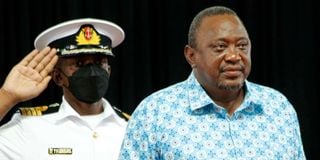Uhuru Kenyatta: State has done well in education

President Uhuru Kenyatta at the 45th Kenya Secondary School Heads Association Annual Delegates Conference in Mombasa on April 20, 2022.
What you need to know:
- President said since 2013, enrolment in secondary schools has increased from 1.3 million in 2008 to nearly 3.6 million in 2022.
- The President defended the competency-based curriculum, which has come under sharp criticism.
President Kenyatta has defended the performance of his government in the education sector and challenged the incoming regime to build on the progress made on funding, curriculum reforms and recruitment of teachers.
The President enumerated the achievements made during his tenure, ranging from the 100 per cent transition from primary to secondary schools, enhanced education budget, recruitment of 120,153 teachers and the roll out of the competency-based curriculum (CBC).
Mr Kenyatta was addressing the 45th Kenya Secondary Schools Heads Association (Kessha) conference in Mombasa yesterday.
“Since 2018, more than 90 per cent of [the Kenya Certificate of Primary Education] candidates have transitioned to secondary schools, and ... over 70 per cent of the learners are enrolled in free day schools secondary,” he said.
On Tuesday, a teachers’ union had called for the recruitment of more teachers ahead of the CBC roll-out in secondary school in January. The principals also petitioned the government to increase capitation funding and allow them to charge more fees for boarding secondary schools.
Mr Kenyatta said since 2013, enrolment in secondary schools has increased from 1.3 million in 2008 to nearly 3.6 million in 2022.
In 2015, the government increased the capitation per learner in secondary schools from Sh10,265 to Sh12,870 and then in 2018 took it to Sh22,244. Two years ago, the Elimu Scholarships programme that benefits 9,000 bright students from poor homes yearly was introduced. The Jomo Kenyatta Foundation Scholarships have also benefited 4,500 students since 2013.
Under sharp criticism
The President defended the CBC, which has come under sharp criticism, with a case seeking to have the curriculum reverted to the 8-4-4 system still pending in court.
“CBC seeks to nurture every learner’s potential, to emphasise practical as opposed to theoretical learning, application of knowledge and acquisition of competencies as opposed to [rote learning] and provides opportunities for acquisition of values and participation in community service,” said Mr Kenyatta. When schools reopen next week, the President said, more than 9,000 learners will be under the CBC.
During his tenure, Mr Kenyatta said, education infrastructure, such as classrooms and furniture has been expanded, alongside connection to electricity. The government has a target of building 10,000 new classrooms by the time Mr Kenyatta leaves office in August. So far 6,470 units have been completed.
He praised the teacher recruitment programme, saying, the Teachers Service Commission budgetary allocation had risen from Sh116.4 billion in 2016 to Sh288.6 billion this year. As a result, 120,153 new teachers have been hired since 2013.
“We have also introduced a comprehensive medical cover for all teachers and their dependants,” he said.
However, according to the TSC, the country still has a shortage of more than 100,000 teachers. Mr Kenyatta thanked teachers for their perseverance during the Covid-19 pandemic when learning was halted for 10 months.






